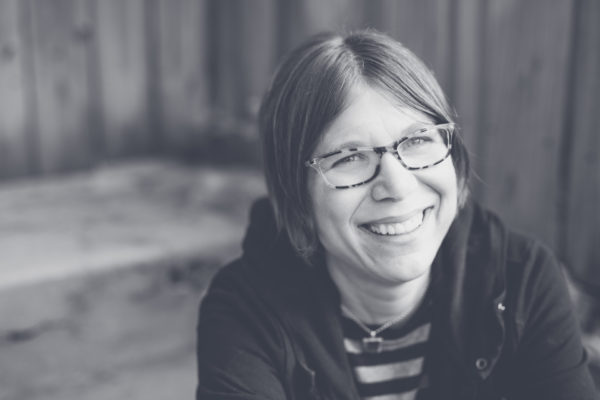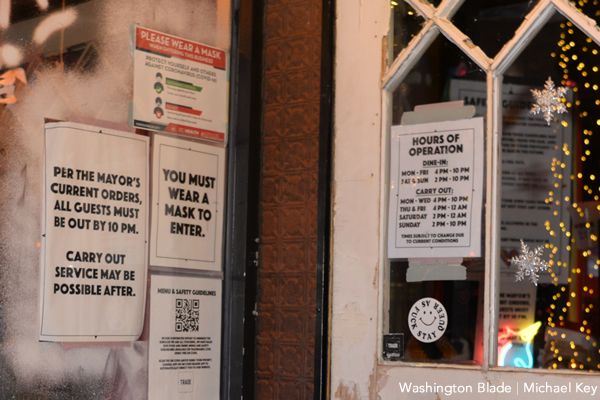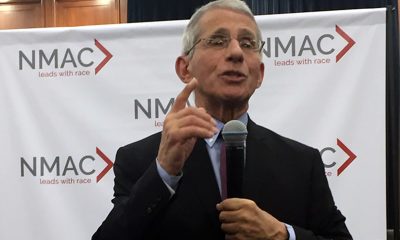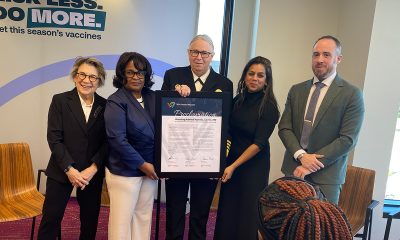Coronavirus
Empathy is saving my business
As a FLOCK, we give time, money, space, and our passion for real change.


I own a family of mid-sized property management companies in the District proper. My passion for the hands-on work of “landladying” took shape 15 years ago when I purchased a little historic adobe duplex in Tucson, Arizona. Property management had always been my side hustle, but in 2008, landladying for a living started to sound good. So I gave up my nonprofit work and went all in. Today, at Flock, our companies keep 52 folks employed and aggregate 6.5 million in business annually. All told, we manage over a billion dollars in real estate. And we built the companies one door at a time.
I never thought of myself as a risk taker, but starting a business at the very height of the great recession was certainly a leap of faith. In the early days, though, with just a few team members and zero payroll, I was really only risking my time and sanity. That I could launch what would become a thriving business in the height of a recession felt like a feather in my cap. I love to solve problems; I’m at my best facing challenges, finding ways to thrive despite the circumstances.
But when this pandemic hit, suddenly, my time and talent weren’t all that was at stake. I worried hard. And early. How would I protect my employees? How would I serve and soothe my clients and, importantly, our residents?
I started my business for the same reason most people do: I wanted to make money. But I also wanted to change lives. For the better. Like a lot of successful business people, I grew up in financial insecurity. Yet I was the kind of kid who saw the potential for earning money everywhere she looked. I washed cars, I shoveled walks, I vacuumed houses, I cared for pets, I sold Girl Scout cookies to pay for summer camp. But my deepest dream was to work in an office. My mother didn’t understand my burning need to be an entrepreneur, but when I was 11 years old she took pity and offered me one half of our ramshackle garden tool shed to do with what I pleased.
What I pleased was to set up my enterprise, The Sherlock Holmes Detective Agency, a name of which I was very proud and found not the least bit unoriginal. Although I’d read all the Nancy Drew mysteries I could find, I had an uneasy grasp on what the work of a nonfiction detective entailed. Nonetheless, I had a very clear picture of myself sitting behind my desk, taking meetings with distraught clients to review the scope of their mysteries.
Given that our house was in a perpetual state of repair, construction scraps were at my disposal. I mounted leftover squares of drywall inside the shed and made a patchwork rug from carpet remnants. I painted the walls yellow and created a makeshift chair from a wooden box that wobbled only a little.
To land my first client I would need to advertise my services, so I rode my bike to the offices of the local newspaper to take out an advertisement. I remember Roberta, the editor and sole employee of the Idaho Mountain Express as a kind woman who treated my request with grave professionalism. Now that I’m a parent I can imagine this moment through her eyes. I feel such gratitude for her simple display of empathy.
Like every other nimble business, my company has gone virtual, and quickly. Today my life is about live chats, board meetings via Zoom, virtual home inspections, camera-based maintenance diagnostics, and leveraging technology with vendors. We’ve streamlined communications and found new efficiencies in our workflows that impact everything from banking to processing applications and managing relationships. We’re engaging new vendors and contractors; the kind of people who can pivot as quickly as we do. We’re also spending more time on our company culture, on thought leadership, and–of course–on financial modeling to stay afloat. Most importantly, we’re checking in and contributing to the wellness of our community, our residents and our clients.
Since this crisis began, we have operated under the philosophy that it’s better to risk making tough decisions too early than bad decisions too late. In early March, long before any states began to issue stay-at-home directives, we furloughed our maintenance team, while projecting a $225,000 monthly drop in revenues. This has resulted in not so much a financial gap to bridge as a yawning, terrifying chasm. But there was no question: we needed to prioritize public health over profit and even solvency. I knew that working quickly to solve for the worst possible scenario would help us save our Flock in the long run.
As every good leader knows, the buck stops at the top. What every good leader also knows is that when the bucks run out, the top should be paid last. Tragically this ethic is practiced so infrequently in the U.S. that it becomes an exception to celebrate and the rarest demonstration of servant leadership. Owners paying themselves last should be the rule, not the exception. I am the person who hired our teammates; they and their families rely on me for their livelihood. How could I possibly accept a full paycheck during this time?
I took a 75 percent pay cut for the duration of the crisis. I now make just enough to cover the mortgage, utilities, food, and the babysitter, who can of course no longer babysit. Like so many of my employees, I’ve asked her–and she’s happily agreed–to perform a different job for a while. She’s become an essential worker, shopping for groceries for me and the management team as well as the two families sheltering in my guest house and basement apartment.
I asked our management team to accept a 5 percent cut; in response they offered 10. They also offered to halt their retirement savings payments so that the company could save on our 401k match program. We are running on fumes, operating in short-term crisis mode; hoarding cash that doesn’t need to go out the door. We are focusing on payroll and small business vendors and covering bills that would threaten our credit worthiness or expose us to liability if they went unpaid. Everything else–property taxes, utilities, scores of other invoices–have been put on ice.
As for the rest of the staff, we are resetting the financial clock every 14 days in order to guarantee their salaries for the following six weeks. We’re still offering 100 percent employer paid benefits and health care. My financial models are continually evolving. There is no long-term financial plan because that would be an exercise in futility and frustration, given things are changing so quickly.
But we know nonetheless that nothing will be the same once we emerge from this crisis, and so a long-term vision for our company is emerging, driven by a staff that is incredibly, doggedly motivated to make it work.
I am disheartened by the behavior of some of my competitors and colleagues during this crisis. Landlords are emailing impersonal newsletters screeching CORONAVIRUS in the subject line, or worse, nastygrams reminding tenants their rent is due on the first no matter what. They inform them in insensitive language about the availability of public assistance and food banks.
At Flock we’ve refurbished our website to be a pandemic information hub. We send residents newsletters driven by caring and empathy and positivity. Most importantly we reduced rent by 15 percent in the buildings we own. A colleague asked me why I did this, what did I see as the long game here, what was the strategy? I didn’t have an answer. I did it because I could. And for me, that means I must. I did it because empathy is my engine.
Let me assure you I am no saint nor martyr. I am in survival mode like everyone else. It turns out that for me, servant leadership helps me survive. Frankly the adrenaline rush I get when I’m trying to solve a big problem is like an opiate for me. Yet also a way of healing: because my young life was marked by a deficit of concern for my state of mind and physical well-being, I developed a hunger for empathy. Since I wasn’t getting the empathy I needed, I discovered as I grew up that showing empathy to others filled that void. This empathic urge, combined with an unabashed need to be in charge, led me to stumble organically into a leadership style that I’ve refined over the years and which I’ve come to see as essential to the success of my business.
Empathy is not a common keyword, shall we say, in the property management industry. Or in business in general. My industry in particular has earned its reputation.. Common wisdom suggests that in order to succeed, a landlord must resist all her empathic urges or simply fail. But expressing empathy–in word and action–is what feeds me. I wish more people would try it. I wish our culture allowed for it. Some people have no idea how good it feels.
The same grit I used as a young side hustler is serving me well now. All those childhood freelance gigs helped me prepare financially for worst case scenarios. Shoveling walks and playing detective didn’t exactly prepare me for the enormity of a global pandemic, but it did get me ready for something at least medium big.
Ever since the backyard garden shed office, I’ve known that any company I started would be anchored in generosity. To that end, I’ve always measured profit not in dollars but in the number of good jobs we create; good jobs that mean people can not just pay their bills but enjoy their lives. I want to create career paths and provide healthcare and ensure people have time with their families both now and in the future. So even when faced with this imminent and shocking loss of revenue, the math was simple: since profitability means good jobs, then we’ll remain profitable as long as we can.
The hardest moment I’ve ever experienced in any job anywhere came just two weeks ago, when I had to tell my employees that we needed to be worried for our livelihoods. I told them the leadership team was working on continuity and I shared our short-term planning in great detail. I told them I was thinking of them twenty-four seven.
I was alone in my home office, saying these impossible, unthinkable words, and knowing in my heart of hearts that despite these dark circumstances this was also one of the greatest moments of my professional life. I was occupying the intersection of concern, ingenuity and innovation, panic, anxiety and adrenaline, uncertainty and grief, exhaustion and sophisticated planning. In that moment, I was my very best self.
Lisa Wise is the Owner and CEO of Flock DC. For more information visit flock-dc.com.
Coronavirus
D.C. mayor to lift all restrictions on bars, nightclubs on June 11
‘We will definitely be celebrating Pride’ next month

D.C. Mayor Muriel Bowser announced at a news conference on Monday that a continuing trend of significantly lower numbers of coronavirus cases and deaths in the city has enabled her to fully lift capacity and other restrictions on most businesses, including restaurants and places of worship, on May 21.
The mayor said bars and nightclubs will be allowed to increase indoor capacity from the current 25 percent to 50 percent on May 21, with all capacity restrictions for bars and nightclubs to be removed on June 11.
The mayor’s announcement came after representatives of the city’s nightlife businesses, including the city’s gay bars and restaurants, expressed concern that D.C. had yet to lift its capacity restrictions beyond 25 percent while surrounding jurisdictions in Maryland and Virginia had already lifted most restrictions.
“On May 21, restrictions on public and commercial activity, including capacity limits, types of activities, and time restrictions, will be lifted,” the mayor’s directive says.
It says restrictions for bars and nightclubs would continue at a 50 percent capacity from May 21 through June 11. The directive says restrictions for large sports and entertainment venues would also continue from May 21 to June 11, which includes a requirement such events apply for a waiver of the restrictions on a case-by-case basis.
“On June 11, capacity limits and restrictions will be lifted on those venues that cannot fully reopen on May 21,” the directive says.
In response to a question at the news conference, Bowser said the June 11 date would essentially end all restrictions on nightclubs and bars, including the current requirement that they close at midnight rather than the pre-epidemic closing times of 2 a.m. on weekdays and 3 a.m. on weekends.
In a development that could have a major impact on plans for D.C.’s LGBTQ Pride events, the mayor’s revised health directive announced on Monday includes the lifting of all capacity restrictions on large outdoor and indoor sports and entertainment events beginning on June 11.
That change would remove restrictions that have, up until now, prevented D.C.’s Capital Pride Alliance from holding its annual Pride Parade and Festival in June during Pride Month.
Capital Pride Executive Director Ryan Bos told the Washington Blade shortly after the mayor’s announcement that Capital Pride is assessing its options for expanding its current plans for in-person events in June.
“We will definitely be celebrating Pride in June,” Bos said. “We just received this information as well. So, we will be getting further information,” he said. “We have not been informed that they will be issuing any permits yet, so at this time we are moving forward with our original plans for doing things.”
Bos was referring to a city requirement for obtaining permits for street closings and use of other public spaces for events such as a parade or street festival. He said existing plans, among other things, call for an informal parade of cars and other vehicles on June 12 that will drive throughout the city to view homes and businesses that will be decorated with Pride displays such as signs, photos, and other symbols of Pride.
Those familiar with the city’s past Pride events don’t think there will be enough time for Capital Pride to organize the traditional large parade and street festival in time for June. But Capital Pride officials have talked about holding a possible parade and festival in October, and the lifting of the capacity restrictions announced by Bowser on Monday would likely make that possible.
In addition to lifting all capacity restrictions on May 21 for restaurants, the mayor’s May 21 timeframe for lifting restrictions includes these additional venues and events:
- Weddings and special events
- Business meetings and seated conventions
- Places of worship
- Non-essential retail
- Personal services
- Private at-home gatherings
- Libraries, museums, galleries
- Recreation Centers
- Gyms and fitness centers
- Pools
- Office space
- Schools
- Childcare
“We’re very pleased that over the last several days, we have seen our case spread, our community spread numbers, venture out of the red into the yellow and fast approaching the green,” Bowser said in referring to a health department chart that shows the changes in coronavirus cases in the city.
“You might remember that our daily case rate peaked in January at 45.9. And today you can see it’s down to 6.6,” she said at her news conference on Monday.
“Throughout this process I have said how proud I am of D.C. residents and businesses who have responded, who have followed health guidance and have worked together to help protect our community throughout the pandemic. And we see it in these numbers today,” she said.
“Containing the virus will continue to require all of us to be focused on maintaining a robust health system,” the mayor said, adding that while over 200,000 D.C. residents have been fully vaccinated since December 2020, “many more thousands” still need to be vaccinated. “Vaccines are free and available on demand at walk-up sites across the District,” she said.
The mayor also noted that the city will continue to require residents and visitors to use a mask in accordance with existing and updated guidance set by the U.S. Centers for Disease Control and Prevention.
Mark Lee, coordinator of the D.C. Nightlife Council, an association that represents restaurants, bars, nightclubs and other entertainment venues, said the mayor’s directive on May 10 leaves some details to be addressed but will open the way to bring nightlife businesses back to life.
“What we do know is that on Friday, May 21, businesses begin returning to normal operations and, three weeks later, on June 11, all restrictions for all businesses in the District will end,” Lee said. “It’s a day we’ve long awaited and one that will save much of our community enterprise from financial ruin.”
Coronavirus
DC residents with HIV eligible for COVID vaccine
Mayor announces expanded eligibility as vaccine supply increases

D.C. Mayor Muriel Bowser announced on Feb. 24 that D.C. residents between the ages of 16 to 24 who have one of 19 pre-existing medical conditions, including HIV, will now be eligible to make an appointment to receive the COVID-19 vaccine.
The mayor and D.C. Department of Health Director Dr. LaQuandra Nesbitt said the appointments could be made through the city’s special site, vaccinate.dc.gov, beginning Thursday and Friday, Feb. 25 and 26. The vaccinations themselves for the expanded group of residents, including people with HIV, would begin March 1, the mayor said in an announcement.
Abby Fenton, a spokesperson for Whitman-Walker Health, the D.C. community health center that provides services to the LGBTQ community and people with HIV, said Whitman-Walker has begun contacting its HIV patients about the availability of the COVID vaccine for them.
“We are urging people to try to make an appointment with the city because we have such a limited supply,” Fenton said. She said Whitman-Walker is dispensing the vaccine for those who the city determines are eligible at its medical center locations at 1425 14th Street, N.W., and at its Max Robinson Center at 2301 Martin Luther King Jr. Ave., S.E.
Michael Kharfen, the DOH official in charge of the city’s HIV/AIDS, Hepatitis, STD, and Tuberculosis Administration, said the limited supplies of the COVID vaccine that the city has been receiving from the federal government has prevented the allocation of vaccine supplies to community health centers like Whitman-Walker until a few weeks ago.
He said supplies of the vaccine have increased in recent weeks and the Department of Health was hopeful that it will be able to provide additional supplies of the vaccine to community health centers and other facilities and health care providers.
Kharfen noted that the city has been increasing the availability of the vaccine to different groups of residents in stages as supplies have increased. Front line medical workers and nursing home residents were the first to receive the vaccine. The most recent group to become eligible prior to the mayor’s most recent expansion this week were people 65 years of age and older.
The mayor’s announcement on Feb. 24 listed these pre-existing medical conditions, including HIV, that would make city residents between the ages of 16 and 64 eligible for the COVID vaccine:
Asthma, Chronic Obstructive Pulmonary Disease (COPD), and other Chronic Lung Disease; Bone Marrow and Solid Organ Transplantation; Cancer; Cerebrovascular Disease; Chronic Kidney Disease; Congenital Heart Disease; Diabetes Mellitus; Heart Conditions, such as Heart Failure, Coronary Artery Disease, or Cardiomyopathies; HIV; Hypertension; Immunocompromised State; Inherited Metabolic Disorders; Intellectual and Developmental Disabilities; Liver Disease; Neurologic Conditions; Obesity, BMI ≥ 30 kg/m2; Pregnancy; Severe Genetic Disorders; Sickle Cell Disease; and Thalassemia.
Coronavirus
D.C. gay bars struggling to stay open in pandemic
Mayor’s new rule banning liquor sales after 10 p.m. called ‘devastating’


John Guggenmos, co-owner of the D.C. gay bars Number 9 and Trade, says he and his business partners support Mayor Muriel Bowser’s efforts to keep people safe as the number of people testing positive for COVID-19 continues to rise in the city.
But Guggenmos and other gay bar owners say the mayor’s most recent order requiring bars and restaurants to stop serving alcoholic beverages after 10 p.m. has had a devastating impact on what had already been a major decline in business since the COVID restrictions were put in place earlier this year.
“We see hope on the horizon,” Guggenmos said. “But for many places it’s just going to be too late. It is sad because even if I am in a position that we can weather this storm better, if other places in the neighborhood don’t, then we all suffer.”

David Perruzza, owner of the Adams Morgan gay sports bar Pitchers and its adjoining lesbian bar A League of Her Own, said gay bar customers traditionally come out to the clubs after 9 p.m. and often remain there several hours later.
Under the mayor’s current Phase II rules for addressing the COVID health emergency all restaurants and bars must close at midnight, two hours earlier than the pre-epidemic closing time of 2 a.m. during the week and three hours sooner than the normal 3 a.m. closing time on weekends. That restriction by itself has resulted in a significant drop in revenue for bars and nightclubs, including LGBTQ clubs, officials with the clubs have said.
The new restriction put in place last month banning liquor sales after 10 p.m. allows bars and restaurants to continue to stay open until midnight. But Guggenmos, Perruzza and other bar owners say few if any customers would likely come in to order non-alcoholic beverages. Thus they and nearly all of the city’s bar and restaurant owners have decided to close at 10 p.m. until the restrictions are lifted, a development that has further curtailed their businesses.
“I’ve had the worst two weekends of my life at the bar,” said Perruzza in referring to the weekends following the ban on liquor sales after 10 p.m. “I can’t sustain a business this way,” he said.

Dr. LaQuandra Nesbitt, director of the D.C. Department of Health, has said city inspectors have found that more violations of the COVID-related health restrictions at restaurants and bars, such as social distancing and mask wearing, were occurring after 10 p.m. as patrons consumed more alcohol. But nightlife advocates have disputed claims that riskier behavior occurs after 10 p.m. They say there are no studies or data to back up those claims.
Perruzza said he understands that while the mayor’s intention is to curtail the spread of the coronavirus he believes the 10 p.m. cutoff on alcohol service will result in large numbers of bar customers going to private parties in people’s homes where there will be fewer safeguards to curtail the virus.
“By her doing this she is going to push people to have more house parties,” Perruzza said. “At least if they’re in a restaurant or bar they’re in a controlled environment where they take their temperature. They make sure everything is sanitized after people leave,” Perruzza said. “People are not required to wear masks when they go to house parties.”
Prior to the start of the pandemic, D.C. was home to at least 15 gay bars or nightclubs in which the clientele was largely LGBTQ. A number of other D.C. bars and nightclubs are considered LGBTQ friendly, according to gay D.C. nightlife advocate Mark Lee, who said those additional establishments have a significant LGBTQ clientele.
In March, Bowser issued her initial emergency health order requiring all “non-essential” businesses, including bars and restaurants, to temporarily close their indoor operations to customers in an effort to curtail the spread of the coronavirus. Carryout food and drink orders were allowed, and some of the gay clubs joined other bars and restaurants in putting in place a take-out order business.
A short time later, the DC Eagle, the city’s longest continuously operating gay bar, announced it was permanently closing. The Eagle’s majority owner filed for Chapter 7 bankruptcy following longstanding financial problems, but many of the Eagle’s customers believe the pandemic played some role in the permanent shutdown.
At the same time, the popular LGBTQ nightclub Ziegfeld’s-Secrets closed its doors indefinitely after the owner of the building where it was located in the city’s Buzzard’s Point area invoked its longstanding plan to demolish the building to make way for a new condominium and retail development. Ziegfeld’s-Secrets manager Steve Delurba said the club would like to reopen in a new location but efforts to reopen would have to wait until all COVID-19 restrictions on such establishments were lifted.
Among the city’s remaining 13 LGBTQ bars and clubs, all but one has reopened after the mayor put in place the city’s Phase II business reopening plan in June, which allowed bars, restaurants, and other businesses to resume limited indoor operations.
The Fireplace, a gay bar at 2161 P St., N.W. near Dupont Circle, decided to remain closed rather than operate under the COVID restrictions but “definitely” plans to reopen, according Larry Ray, a longtime customer who said he spoke with one of the owners.
Among the other Phase II restrictions for bars, restaurants and nightclubs put in place by Bowser in the spring was the requirement that such establishments must operate at 50 percent of their normal indoor capacity, all patrons must be seated at tables spaced six feet apart, and at least three food items must be served that are prepared on the premises regardless of whether the establishment was exempt from serving food prior to the pandemic. The Phase II order also bans the establishments from offering live entertainment.
Two weeks ago, when the mayor issued her updated order banning the serving of alcoholic beverages after 10 p.m. at bars and restaurants, she also included in the order a reduction in the capacity of customers from 50 percent to 25 percent based on concern that the number of COVID-19 cases was rising in D.C. after the case number had gone down in the spring and summer.
Perruzza told the Blade that due to the Phase II social distancing requirements and the spacing of tables and the ban on allowing customers to stand except to walk in and out and go to the bathroom, Pitchers and his adjoining bar A League of Her Own were never able to reach a 50 percent capacity. At most, he said, he was able to reach a 33 percent capacity, which now must be reduced to 25 percent.
Meanwhile, the D.C. gay bar Dirty Goose at 913 U St., N.W. is among the establishments hit with a fine for allegedly violating the Phase II food serving requirement. According to a report in the Washington City Paper, an inspector from the city’s Alcoholic Beverage Regulation Administration on Nov. 27 cited Dirty Goose for serving only cookies as a food item, saying it failed to provide at least two other types of food such as popcorn or brownies instead of just cookies.
Co-owner Justin Parker told City Paper he plans to contest the citation on grounds that the establishment serves multiple types of cookies that are prepared on the premises and that the different types should be accepted as different food types. He said that ABRA inspectors came to Dirty Goose six or seven times in November prior to citing him for the food violation and found his establishment to be in full compliance with all of the COVID related requirements.
On its Facebook page the Dirty Goose announced on Nov. 10 that it had voluntarily closed its doors after one of its employees tested positive for COVID and out of caution it would remain closed until all remaining employees were tested. On Nov. 15 it announced “we have received all our employees test results and we are ready to reopen,” which happened less than a week later.
In a Nov. 25 Facebook message, Dirty Goose conveyed what appears to be the sentiment shared by the other LGBTQ bar owners and operators.
“First, we would like to thank all of our wonderful family of patrons who have kept us going since May,” the message says. “What a crazy 8 months it’s been!” After announcing the Dirty Goose would be closing at 10 p.m. each day due to the mayor’s order banning alcohol sales after that hour, the message added, “We look forward to continue serving all of you and please know we are continuously following the safety requirements set by the DOH and the safety of our staff and patrons remains our main priority.”

Lee, the longtime D.C. nightlife advocate who served as director of the D.C. Nightlife Council before being furloughed, said the 10 p.m. cutoff for the sale of liquor at bars and restaurants will be especially harmful coming with all the other restrictions.
“The most maddening aspect of Mayor Bowser suddenly halting all alcohol consumption after 10 p.m. at local bars, restaurants, and nightclubs operating in full compliance with public safety protocols and highly restricted service limitations is that there is no actual data or evidence-based rationale for this financially devastating roll-back curfew,” Lee told the Blade.
“This arbitrary edict jeopardizes the survival of hospitality establishments by causing them to lose the major portion of revenue they had been able to generate,” he said. “We’re getting reports that this decision is costing operators up to 60 percent or more of the little money they were making, leaving most with no choice other than to shut down two hours earlier rather than attempt to now serve only food items and non-alcoholic beverages until midnight,” Lee said.
Lee noted that at a press conference on Dec. 7, Bowser acknowledged that nightlife establishments, including restaurants and bars, have done an exemplary job of complying with health requirements and providing a safe space for patrons and employees.
At that press conference the mayor also said she looks forward to being able to lift all restrictions on businesses once the COVID vaccine becomes widely available. But she said that with a resurgence of COVID cases in D.C. in recent weeks along with the rise in cases in the surrounding suburbs the city could be forced once again to order the complete shutdown of indoor operations of businesses like restaurants and bars if the local COVID situation worsens.
Perruzza, Guggenmos and Doug Schantz, owner of the gay sports bar Nellie’s at 900 U St., N.W., each said their establishments and others like them serve as a place where LGBTQ people can go to be themselves, which many are unable to do at work, school, or even at home in some situations.
“At some point safe human interactions are what people are craving,” said Guggenmos. “You see someone on the street and how they desperately just want that interaction again,” he said. “If we could do that safely, why not?”
D.C.’s LGBTQ Bars/Restaurants
Nellie’s Sports Bar
900 U Street, N.W.
202-332-6355
Uproar
639 Florida Ave., N.W.
202-462-4464
The Dirty Goose
913 U Street, N.W.
JR.’s
1519 17th Street, N.W.
202-328-0090
Windows/DIK Bar
Upper floor at Dupont Italian Kitchen
1637 17th Street, N.W.
202-328-0100
Annie’s Paramount Steakhouse restaurant/bar
1609 17th Street, N.W.
202-232-0395
Larry’s Lounge
1840 18th Street, N.W.
202-483-1483
Pitchers/League of Her Own
2317 18th Street, N.W.
202-733-2558
Duplex Diner
2004 18th Street, N.W.
202-265-7828
The Fireplace
2161 P Street, N.W.
202-293-1293
[Temporarily closed during pandemic]
Number Nine
1435 P Street, N.W.
202-986-0999
Trade
1410 14th Street, N.W.
202-986-1094
Green Lantern
1335 Green Court, N.W.
202-347-4533
D.C. LGBTQ-friendly Bars/Clubs
Dacha Beer Garden
1600 7th Street, N.W.
202-350-9888
9:30 Club
815 V Street, N.W.
202-265-0930
DC 9 Nightclub
1940 9th Street, N.W.
202-483-5000
Dito’s Bar
Lower floor at Floriana Restaurant
1602 17th Street, N.W.
202-667-5937

-

 U.S. Supreme Court3 days ago
U.S. Supreme Court3 days agoSupreme Court to consider bans on trans athletes in school sports
-

 Out & About3 days ago
Out & About3 days agoCelebrate the Fourth of July the gay way!
-

 Virginia3 days ago
Virginia3 days agoVa. court allows conversion therapy despite law banning it
-

 Federal Government5 days ago
Federal Government5 days agoUPenn erases Lia Thomas’s records as part of settlement with White House












